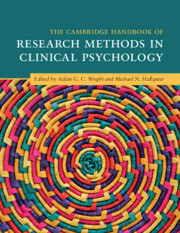Book contents
- The Cambridge Handbook of Research Methods in Clinical Psychology
- The Cambridge Handbook of Research Methods in Clinical Psychology
- Copyright page
- Contents
- Figures
- Tables
- Contributors
- Acknowledgments
- Part I Clinical Psychological Science
- Part II Observational Approaches
- Part III Experimental and Biological Approaches
- 9 Conceptual Foundations of Experimental Psychopathology
- 10 A Practical Guide for Designing and Conducting Cognitive Studies in Child Psychopathology
- 11 Peripheral Psychophysiology
- 12 Behavioral and Molecular Genetics
- 13 Concepts and Principles of Clinical Functional Magnetic Resonance Imaging
- 14 Clinical Computational Neuroscience
- Part IV Developmental Psychopathology and Longitudinal Methods
- Part V Intervention Approaches
- Part VI Intensive Longitudinal Designs
- Part VII General Analytic Considerations
- Index
- References
13 - Concepts and Principles of Clinical Functional Magnetic Resonance Imaging
from Part III - Experimental and Biological Approaches
Published online by Cambridge University Press: 23 March 2020
- The Cambridge Handbook of Research Methods in Clinical Psychology
- The Cambridge Handbook of Research Methods in Clinical Psychology
- Copyright page
- Contents
- Figures
- Tables
- Contributors
- Acknowledgments
- Part I Clinical Psychological Science
- Part II Observational Approaches
- Part III Experimental and Biological Approaches
- 9 Conceptual Foundations of Experimental Psychopathology
- 10 A Practical Guide for Designing and Conducting Cognitive Studies in Child Psychopathology
- 11 Peripheral Psychophysiology
- 12 Behavioral and Molecular Genetics
- 13 Concepts and Principles of Clinical Functional Magnetic Resonance Imaging
- 14 Clinical Computational Neuroscience
- Part IV Developmental Psychopathology and Longitudinal Methods
- Part V Intervention Approaches
- Part VI Intensive Longitudinal Designs
- Part VII General Analytic Considerations
- Index
- References
Summary
Fueled by rapid methodological and analytic advances, functional magnetic resonance imaging (fMRI) has become the dominant method to characterize the relationship between brain function, the environment, and symptoms of psychiatric illness. The widespread adoption of this in vivo imaging approach has allowed for the study of brain systems that underlie symptom expression, treatment response, and risk for illness onset. Yet a host of approaches exist for the collection and analysis of fMRI data, and researchers often struggle to select appropriate study designs and analytic methods. Here we take a critical look at how recent advances in fMRI methods can inform our understanding of brain functions in mental illness. The benefits and limitations of different experimental approaches, from task-evoked fMRI to resting-state designs are described, and how these data provide complementary perspectives on the neurobiological basis of psychiatric illness. Established and cutting-edge analytic techniques for fMRI data are covered. Finally, some of the constraints and limitations on the interpretation of fMRI analyses are reviewed, highlighting common pitfalls to avoid, including issues pertaining to assumptions of mechanistic specificity, causality, diagnostic and symptom specificity, as well as controversial inferential strategies utilized by much of the field.
Keywords
Information
- Type
- Chapter
- Information
- Publisher: Cambridge University PressPrint publication year: 2020
